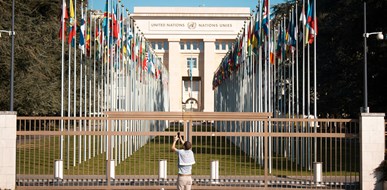[Human Rights Council] United Nations to highlight Asser Institute call for transparency in Italy’s arms exports
Published 14 January 2025
@Daniel Nouri - The UN has concerns about the human rights impact of Italian arms exports.
On Monday 20 January, recommendations made by experts from the Asser Institute regarding Italy’s arms exports will be discussed at the 48th session of the United Nation’s Working Group on the Universal Periodic Review. According to these recommendations, Italy should incorporate human rights due diligence in the decision-making process about its arms exports.
In July 2024, researchers from the Asser Institute, in collaboration with Global Rights Compliance (GRC), submitted a joint stakeholder contribution ahead of the UN Working Group’s fourth cycle of the Universal Periodic Review (UPR) concerning Italy’s weapons transfer practices.
The report urged Italy to ensure that its arms export policies comply with international standards, highlighting the importance of incorporating human rights due diligence into its control mechanisms. As Italy’s human rights record undergoes review next week, the recommendations made by the Asser Institute and GRC are expected to play a key role in shaping the UPR discussion.
According to Asser Institute researcher León Castellanos-Jankiewicz, the recommendations on Italy’s arms export policies are aimed at increasing the transparency and accountability of decisions leading to weapons transfers. Castellanos-Jankiewicz: “The proposals seek to incorporate human rights due diligence in the decision-making process regarding arms exports while harnessing relevant expertise.”
Emphasis on arms transfers
In its summary of stakeholder submissions, the UN Office of the High Commissioner for Human Rights (OHCHR) highlighted gaps between Italy’s arms export laws and its Arms Trade Treaty obligations. Italy’s national report briefly outlined its export authorisation procedures, while the OHCHR’s information compilation cited concerns from UN committees about the human rights impact of Italian arms exports.
On 20 January 2025, Italy will present its arms transfer policies during an interactive dialogue with the United Nations’ Human Rights Council’s UPR Working Group. The universal periodic review is a process which evaluates the human rights record of each UN member state every four and a half years. After the meeting, the Council will adopt an outcome report summarising recommendations and Italy’s voluntary commitments, which will become a key part of its permanent human rights record for monitoring arms export-related violations.
Prepared in the context of the project ‘Enabling Civil Society Efforts to Address the Misuse, Diversion and Abuse of Arms Exports in Latin America’, the submission made by the Asser Institute and GRC highlights the impact of Italian weapons transfers on human rights.
Watch Italy’s Review before the Human Rights Council here.
[Project] ‘Enabling civil society efforts to address the misuse, diversion and abuse of arms exports in Latin America’
This project aims to enable civil society in Latin America to address the misuse, diversion and abuse of arms exports through rigorous documentation and investigation of supply chains, human rights training and advocacy with government and industry stakeholders. For this project, the Asser Institute has partnered with Global Rights Compliance and the Center for Advanced Defence Studies (C4ADS), as well as with Diálogos and Fundación Myrna Mack, two Guatemalan civil society organisations focusing on security policy and human rights. At the Asser Institute, the project is led by senior researcher León Castellanos-Jankiewicz.
Read more
[UN Human Rights Council] Italy urged to increase transparency and accountability for arms exports in new report
A new stakeholder report for the United Nations Human Rights Council by the Asser Institute and Global Rights Compliance urges Italy to ensure its arms export laws comply with international standards and prevent human rights abuses.
León Castellanos-Jankiewicz on Dutch arms exports to Israel: ‘All weapons are used to gain military advantage, and all can be misused’
International legal expert León Castellanos-Jankiewicz was recently interviewed by journalists from the investigative platforms Follow the Money and The Investigative Desk about the Dutch arms export policy. The story, published this morning, sheds light on how the Netherlands has increasingly relaxed its interpretation of international rules on military exports to Israel, despite ongoing conflicts in the region.
EU scrutinises arms export controls as focus shifts to supply chain accountability
EU stakeholders, including Asser Institute researcher León Castellanos-Jankiewicz, met in Brussels to discuss export controls for conventional arms during the Working Party on Conventional Arms Exports (COARM). Intergovernmental bodies are increasingly focusing on supply chain accountability to ensure responsible arms trade. Castellanos-Jankiewicz: “It will be interesting to see how states interpret their obligations to conduct risk assessments prior to deciding on exports.”

